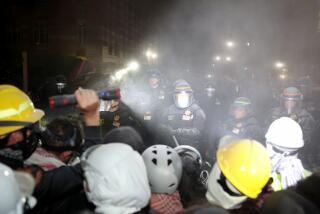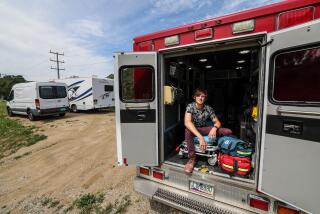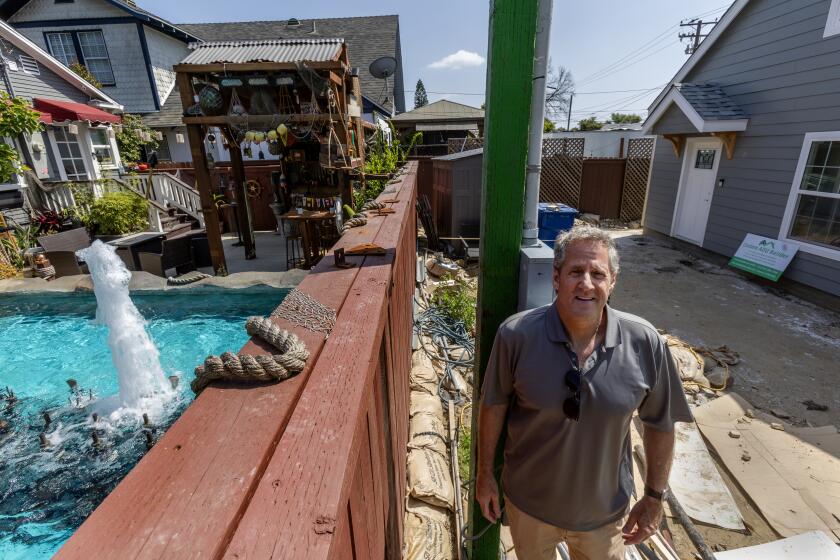Doubt Replaces Camaraderie on La Verne Avenue
Things are different on La Verne Avenue this time around. A dozen years ago, five families who lived on or near a two-block stretch of the East Los Angeles street had sons in the Persian Gulf region, fighting Saddam Hussein. Times reporter George Ramos happened to discover this extraordinary concentration of sacrifice, and throughout the buildup and fighting wrote a periodic series of stories from La Verne.
Ramos’ often-intimate coverage drew national attention to the blue-collar neighborhood of small bungalows. Television crews and sightseers began to visit La Verne, which soon was awash in red, white and blue banners and yellow ribbons. It was a special moment, made even more so by the happy fact that each of the five boys from the neighborhood came home from the war unhurt.
“Oh, it was something,” Frank Saldivar recalled last week as he rolled garbage containers up his driveway. The 78-year-old World War II veteran -- he served under Gen. George S. Patton, fighting across Europe -- has lived on La Verne Avenue for half a century. He now owns two houses on the street, one for himself, another for a daughter. American flags fly in front of each on 20-foot poles.
“I got interviewed twice myself on television,” said Saldivar, who on this blustery day wore a camouflage sweatshirt and an Army-issue knit cap. “I’d always be out working in my yard, and so I’d be the one who was interviewed.”
Asked if there was anybody from the neighborhood overseas now, preparing for war in Iraq, Saldivar shrugged.
“Not that I know of,” he said. “Isn’t that something?
“It’s different now,” he explained. “Look around.”
He glanced up and down the street. There were a few flags on display, but most were faded and frayed. Large dogs paced behind fences in front of many of the homes. The sidewalks were all but empty.
“There is hardly anybody on the street,” Saldivar said. “The street has changed. Nobody is outside. Nobody talks about the war or anything now; it’s just a dead issue. People move out. People forget. Back then, everybody would be out on the street all the time, talking about the latest news. Maybe it’s different this time because nobody from here is involved in it now.”
He pointed across the street, where an old man was playing with a boy on the front porch. They were strangers to Saldivar.
“Maybe if they had a kid over there or” -- he aimed his finger at another house -- “if they had a kid, maybe then we’d all be out: ‘Hey, what do you hear from Roger? What’s going on?’ But it’s dead now.”
There was another difference. Twelve years ago the case for war was not complicated: Iraq had invaded Kuwait and needed to be driven back. This time, for Saldivar, as for so many Americans, there is a lingering ambivalence -- “mixed feelings,” as he put it.
In rapid fire, the old soldier tossed out questions.
“What do we want to do, police the world?
“Why now? We’ve got quick-response forces. If Saddam started to do something, we could be over there quick.
“What about all the money we are going to spend? What about the deficit? This is like me telling my kids, ‘I’m sorry. I can’t buy you any clothes this week because I don’t have any money,’ and then off I go on a spree to Las Vegas.”
He took a couple of steps toward his porch, and then two steps back.
“But I’ll support the troops. I’ll support my country. I’ll support the families that have soldiers over there. They are going to lose people, you know. I’d go again myself if they needed me. If I could do it again, I would do it again.
“I just don’t understand it this time. That’s all. I don’t know. I’m not a politician, I don’t understand.”
Across La Verne and a couple of doors down, Rachel Reyes sat on a couch, a blanket draped over her shoulders, and recalled 1991. Her living room had been an informal central command post for the La Verne Avenue families. Her son Timothy, a Navy SEAL -- and now a Los Angeles police officer -- had been the last to return.
“There was a lot of unity then,” she said. “It was beautiful. There was a lot of support for our sons. Now it seems kind of sad. My husband and I were just talking about it. People just don’t seem to want to go to war this time. There is a hesitancy. And it’s sad, because our troops are over there. They need our support. They are all so young, and I feel sad that they might hear there are all these protests.”
Reyes said she wasn’t sure why there weren’t any youngsters from La Verne deployed to the Middle East this time around. She knew of one neighborhood boy who, inspired by her Timothy, had joined the Navy, but he was still stationed stateside.
“Before, there were so many boys in the military from around here,” she said. “They’re just not enlisting now like they used to. I’m not sure why. What I see now are more kids going to college. That’s good too. But they are not enlisting like they did.”
Reyes said there was a long tradition of military service among families in the El Paso barrio where she grew up: “Mama said it was not so much about culture, but that there wasn’t anything else for our boys to do back then. There weren’t jobs.”
A black-and-white photograph of a young man in uniform rested on top of a piano in the front room. It was Reyes’ brother, killed in Korea: “I remember Mama telling me how she watched him walk out the gate and go down the back alley and never saw him again, never.” A brother-in-law, Reyes said, had died in Vietnam.
Her own son had joined up right after high school. Soon after, Kuwait was invaded. “I had never heard of Kuwait,” Reyes recalled with a smile. “I thought it was in Hawaii.” There were some rough passages in this house, Reyes made clear, watching on television as the first bombs fell, waiting for word from her son and the other boys.
“I feel sorry,” she said, “for the mothers and daughters and wives of the people who are over there now.”
Still, she supports Bush’s call for war, calling Hussein a tyrant who must be stopped “before he can do any more bad things.” As she spoke, a stout-looking young boy burst through the front door, carrying a backpack. It was Reyes’ 13-year-old son, home from school.
“You know,” she said, watching the boy leave the room, “the other day I began to wonder: If this war goes on for a long time....” And then the mother from La Verne Avenue sighed.
More to Read
Start your day right
Sign up for Essential California for news, features and recommendations from the L.A. Times and beyond in your inbox six days a week.
You may occasionally receive promotional content from the Los Angeles Times.







